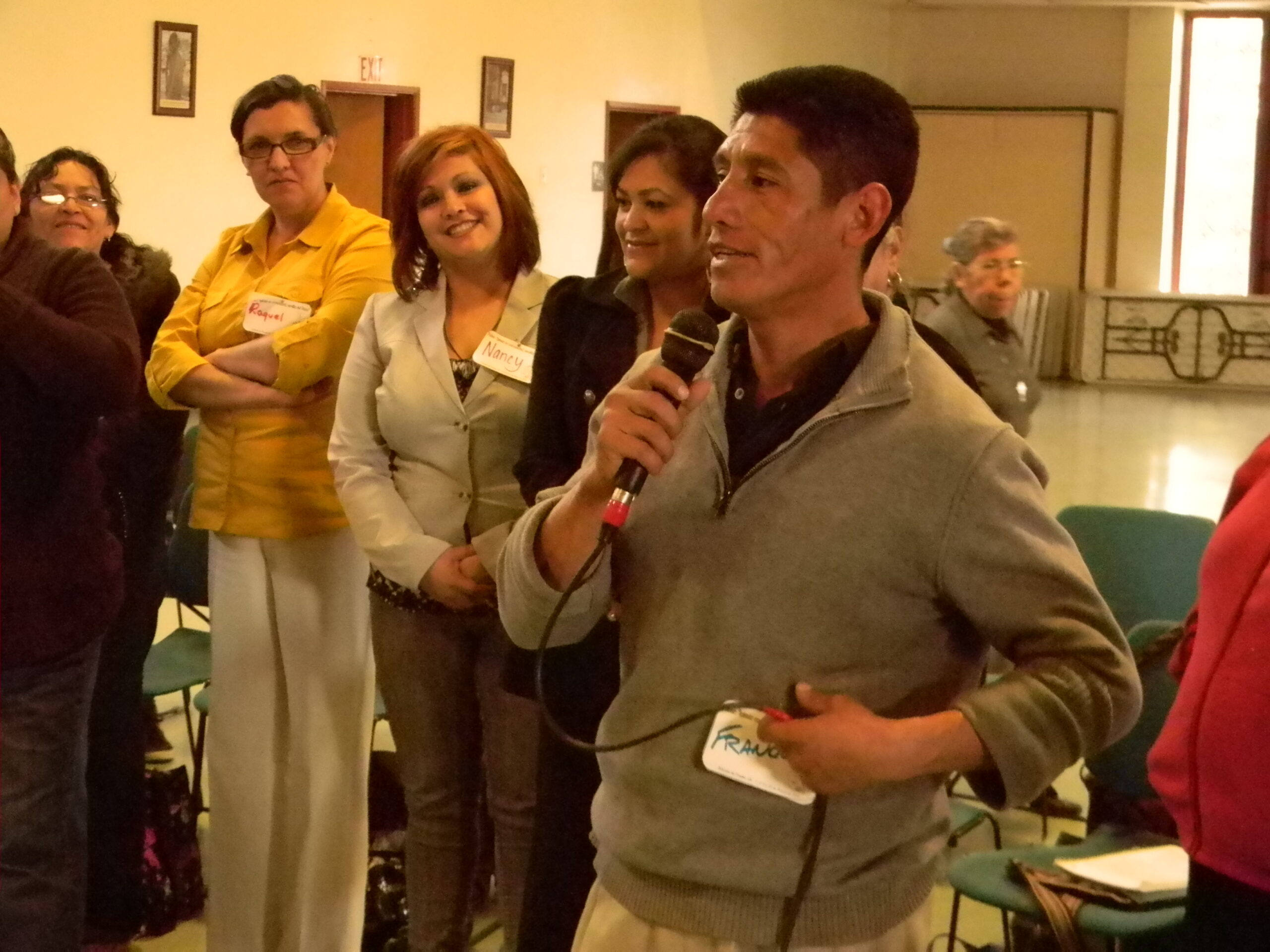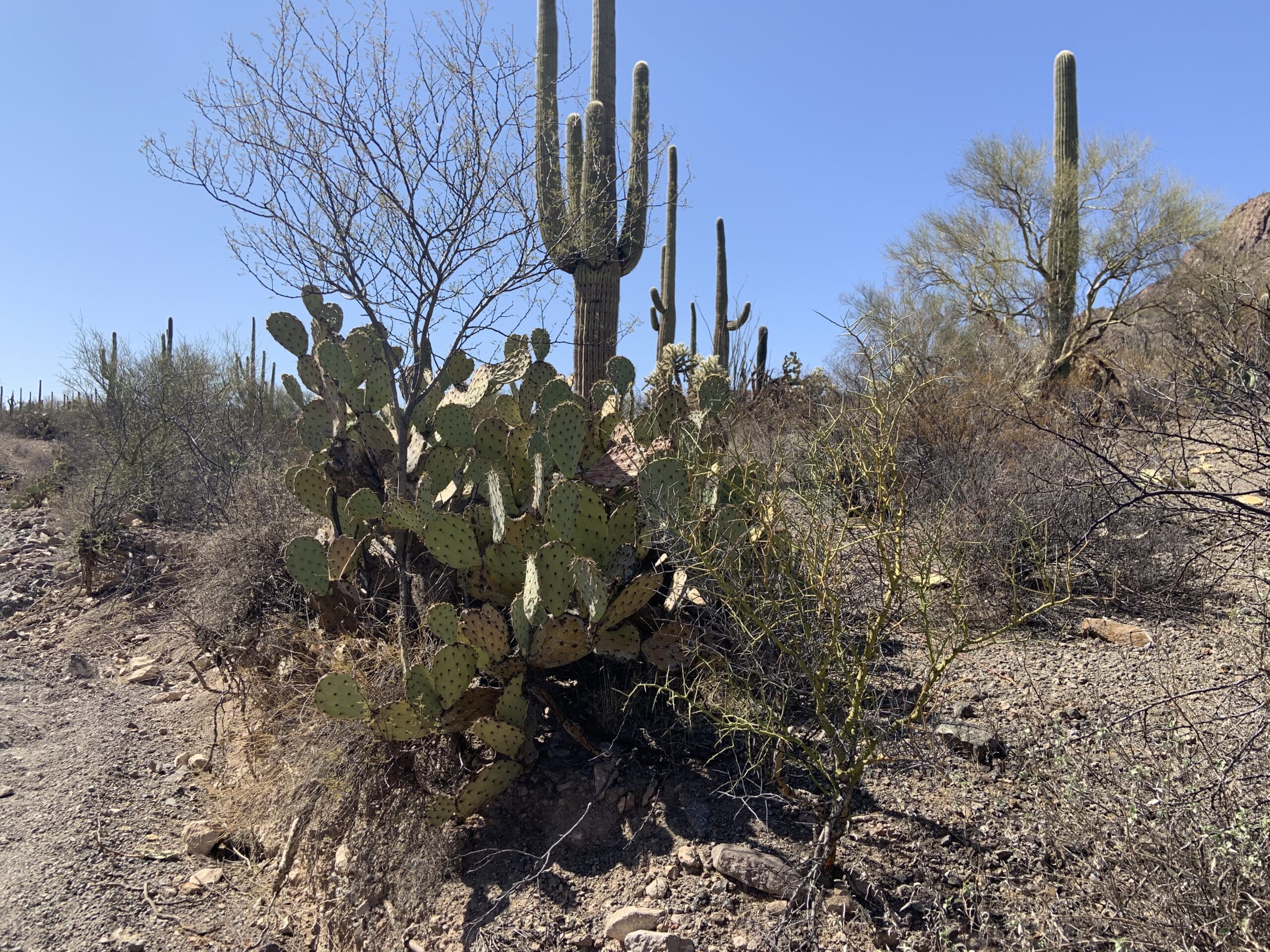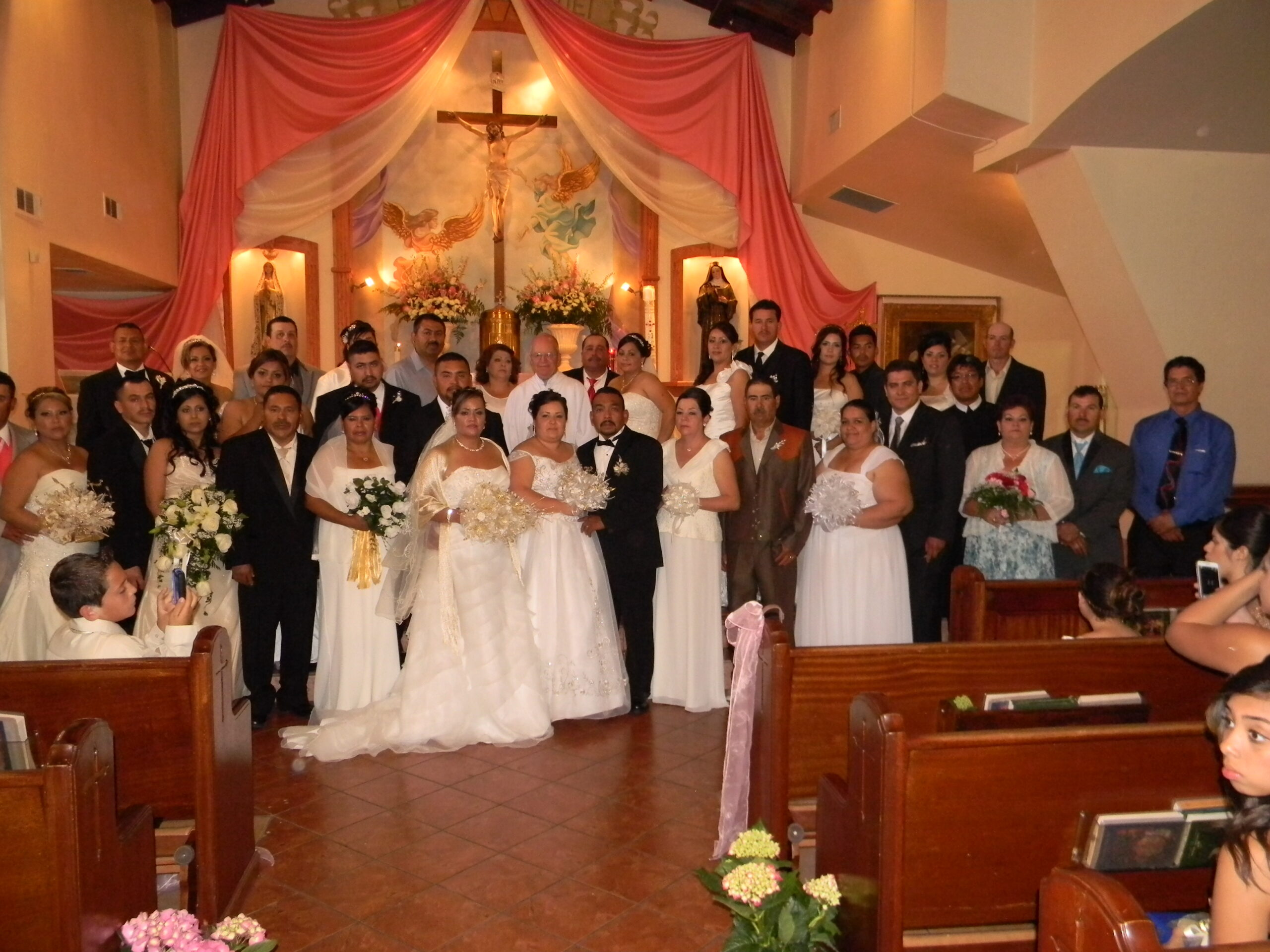“To whom did Jesus proclaim the Kingdom of God.” – “¿A quién proclamó Jesús el Reino de Dios?”
“¿A quién proclamó Jesús el Reino de Dios?”
En estos días, consideramos cómo escuchamos a los pobres. Necesitamos no solo conocer sus luchas, sino entrar una relación con personas de la periferia, los márgenes de la Iglesia. La mejor síntesis de personas evangelizadoras en los márgenes que he escuchado provino del obispo John Steinbock en la convocatoria del clero diocesano en enero de 2010. Este fue su último discurso a su clero. Poco tiempo después de la convocatoria, anunció al clero que su lucha contra el cáncer había regresado y que se estaba muriendo.
Me mostró esta presentación antes de darla ya que se refiere a trabajadores voluntarios y catequistas en el ministerio campesino. Le dije que no cambiaría una palabra. Lo siguiente es solo una parte de su exhortación a su clero.
Necesitamos preguntarnos a quiénes somos y a quiénes no proclamamos el Reino de Dios, en relación con la situación particular de nuestra Diócesis aquí en California Central.
¿A QUIÉN PROCLAMÓ JESÚS EL REINO DE DIOS?
Jesús se encontraba principalmente entre los pobres, los enfermos, los cojos, los que sufrían, los oprimidos, los marginados, los leprosos, los recaudadores de impuestos, los despreciados y despreciados por la clase alta. Fue a estos especialmente a los que proclamó el Reino de Dios y manifestó el amor de Dios. ¿Quiénes son estas personas en nuestra sociedad actual y las de nuestras parroquias? Son los pobres, las familias sin hogar, los campesinos y sus familias, los migrantes, los indocumentados, los enfermos, los presos. La gran mayoría de estas personas rara vez asisten a misa.
Estas reflexiones están hablando de aquellos que viven al margen de la Iglesia, que viven en automóviles, en campos de trabajo, en grupos aislados de hogares, y aquellos que trabajan en las granjas y lecherías que se encuentran en toda nuestra diócesis, tan a menudo sin el lujo del transporte y de llevar una vida programada normal. Debemos ser pastorales, especialmente con aquellos a quienes nuestro Señor ama de manera especial. Es precisamente como estos que comprende el Reino de Dios. Necesitamos incluirlos en nuestra “Visión para el futuro” al tratar de llegar a ellos con un programa de catequesis que puede diferir de los asistentes regulares a la iglesia en nuestras congregaciones.
¿Estamos tan atrapados con los que pertenecen a la parroquia, los que vienen regularmente los domingos y apoyan y toman un papel activo en la parroquia que nos olvidamos de extender la mano y proclamar el Reino de Dios a los pobres y marginados de Dios? Son amados por el Señor de una manera especial, y tenemos la responsabilidad de proclamarles ese amor.
A la mayoría de los pastores les resultaría difícil salir entre ellos simplemente debido a las restricciones de tiempo, pero ¿están abiertos los pastores a que otros los visiten, se acerquen y los catequicen dentro de sus parroquias? Algunos párrocos tienen ministros parroquiales haciendo esto, y los felicito mucho por esto. Como mínimo, un pastor debe permitir y cooperar con las religiosas y los ministros capacitados por la Diócesis para hacer esto dentro de sus parroquias. Enfatizo que cualquiera que enseñe a estos niños debe ser aprobado por el pastor y capacitado como catequista. No defiendo a los catequistas independientes.
La mayoría de nuestros trabajadores agrícolas hispanos y sus familias son católicos, pero rara vez asisten a misa los domingos. Pero tienen fe en Jesús, y también en la Iglesia, y se vuelven a Jesús en sus dolores y luchas, y quieren mucho transmitir su fe a sus hijos. La gran mayoría de ellos no tiene medios para asistir a Misa. Hay grupos de casas y campamentos en todo nuestro valle, donde viven estos trabajadores agrícolas y lecheros y sus familias. ¿Cómo nos acercamos a ellos?
Si vienen a nuestras parroquias para el Bautismo, la Primera Comunión o la Confirmación para sus hijos, ¿les estamos haciendo las mismas exigencias que exigimos a los que asisten a Misa con regularidad y tienen condiciones de vida normales? ¿Estamos exigiendo que tengan una preparación de dos años para estos sacramentos, cuando sabemos que esto sería imposible para la mayoría de ellos, ya que viven una vida de dificultades y luchan todos los días de su vida?
Las pautas para el Bautismo, la Primera Comunión y la Confirmación son importantes, pero están diseñadas para aquellas familias que están educadas y comprenden la importancia de la instrucción en la fe para sus hijos, y viven como parte de la comunidad parroquial. ¿No deberíamos acercarnos pastoralmente a aquellas personas que no están cerca de la Iglesia, pero que tienen fe en el Señor Jesús, y fe en la Iglesia, y que no son capaces de seguir las demandas que muchos les impondrían? ¿Es el sacramento del Bautismo, de la Primera Comunión, de la Penitencia, de la Confirmación una recompensa por vivir de la manera que pensamos que las personas deben vivir de acuerdo con su fe, o son estos sacramentos para el pecador, para ayudarnos a todos a conocer más el amor de Dios en nuestras vidas y lentamente acercarnos un poco más al Señor? Muchas de estas personas ya están luchando por mantener la fe en situaciones muy difíciles y por ganarse la vida a duras penas todos los días del año. Muchas de estas personas ya están luchando por mantener la fe en situaciones muy difíciles y por ganarse la vida a duras penas todos los días del año, y a menudo otras denominaciones religiosas se acercan a ellas, que no les imponen tales exigencias.
Jesús nos llama a acercarnos a los marginados de nuestras parroquias. Nuestra tarea en el ministerio es buscar traer a los marginados a la comunidad de la Iglesia. El mayor regalo que nos ha dado Jesús, para ayudarnos en esto, son los sacramentos, que brindan al pueblo de Dios un encuentro con el mismo Señor Jesús, y nos brindan la oportunidad de catequizar, al menos de manera rudimentaria. La gracia dada en los sacramentos nos reconcilia con Dios y nos conduciría a una implicación más profunda en la comunidad cristiana. Pero este es un proceso y nuestras vidas no cambian de la noche a la mañana. Dios da esta gracia gratuitamente. ¿Es nuestro lugar retener la gracia de Dios al imponer exigencias imposibles a quienes vienen a pedir los sacramentos que valoran y desean mucho para sus hijos?
El obispo Steinbock murió el 5 de diciembre de 2010. Sus reflexiones suenan mucho a partes de la Alegría del Evangelio, pero escribió esto tres años antes de que Francisco se convirtiera en Papa.
(Si tienes observaciones o preguntas para Padre Migrante, envían las a padremigrante@gmail.com)
“To whom did Jesus proclaim the Kingdom of God.”
These days, we consider how we listen to the poor. We need not only to know their struggles, but to enter a relationship with people on the periphery, the margins of the Church. The best synthesis of evangelizing people on the margins that I have heard came from Bishop John Steinbock at the diocesan clergy convocation in January 2010. This was his last address to his clergy. A short time after the convocation, he announced to the clergy that his fight with cancer had returned and that he was dying.
He showed me this presentation before giving it since it refers to volunteer workers and catechists in campesino ministry. I told him that I would not change a word. The following is only part of his exhortation of his clergy.
We need to ask ourselves to whom we are and to whom we are not proclaiming the Kingdom of God, in relation to the particular situation of our Diocese here in Central California.
TO WHOM DID JESUS PROCLAIM THE KINGDOM OF GOD?
Jesus was found mostly amongst the poor, the sick, the lame, the suffering, the oppressed, the marginalized, the leper, tax collectors, those looked down upon and despised by the upper class. It was to these especially that He proclaimed the Kingdom of God, and manifested God’s love. Who are these people in our present society, and those within our parishes? They are the poor, the homeless families, the farm workers and their families, the migrant, the undocumented, the sick, the imprisoned. The vast majority of these people rarely come to Mass.
These reflections are speaking of those that live on the margin of the Church, living in cars, in labor camps, in isolated clusters of homes, and those that work on the farms and dairies found throughout our diocese, so often without the luxury of transportation and of living a normal scheduled life. We should be pastoral, especially to those that our Lord loves in a special way. It is just such as these that the Kingdom of God is comprised. We need to include them in our “Vision for the Future” in seeking to reach out to them with a program of catechetics that may differ from regular church goers in our congregations.
Are we so caught up with those that belong to the parish, those that come regularly on Sunday and support and take an active role in the parish that we forget to reach out and proclaim the Kingdom of God to God’s poor and the marginalized? They are loved by the Lord in a special way, and we have a responsibility to proclaim that love to them.
Most pastors would find it difficult to go out amongst them simply because of time restraints, but are pastors open to others visiting and reaching out and catechizing them within their parishes? Some pastors have parish ministers doing this, and I commend them very much for this. At the very minimum a pastor should allow and cooperate with Religious Women and Ministers trained by the Diocese to do this within their parishes. I emphasize that anyone teaching these children should be approved by the pastor and trained as catechists. I do not advocate freelance catechists.
Most of our Hispanic farm workers and their families are Catholic, but rarely come to Mass on Sunday. But they have faith in Jesus, and also in the Church, and turn to Jesus in their sorrows and struggles, and want very much to hand their faith onto their children. The vast majority of them have no means to come to Mass. There are clusters of houses and camps throughout our valley, where these farm workers and dairy workers and their families live. How are we reaching out to them?
If they come to our parishes for Baptism, First Communion or Confirmation for their children, are we making the same demands on them that we require for those that come to Mass regularly, and have normal living conditions? Are we demanding that they have two-year preparation for these sacraments, when we know that this would be impossible for most of them as they live a life of hardship and struggle every day of their lives?
The guidelines for Baptism, First Communion and Confirmation are important, but they are designed for those families that are educated and understand the importance of instruction in the faith for their children, and are living as part of the parish community. Should we not reach out pastorally to those people who are not close to the Church, but who have faith in the Lord Jesus, and faith in the Church, and who are not able to follow the demands that many would put on them? Is the sacrament of Baptism, of First Communion, of Penance, of Confirmation a reward for living the way we think people should be living according to their faith, or are these sacraments for the sinner, to help us all to know more the love of God in our lives and slowly be drawn a little closer to the Lord? Many of these people are already struggling to keep the faith in very difficult situations, and to eke out a living every day of the year, and are often being approached by other Religious Denominations, who do not put such demands on them.
Jesus calls us to reach out to the marginalized in our parishes. Our task in ministry is to seek to bring the marginalized into the community of the Church. The greatest gift given to us by Jesus, to aid us in this, is the Sacraments, which bring to God’s people an encounter with the Lord Jesus Himself, and presents to us the opportunity to catechize, at least rudimentarily. The grace given in the Sacraments reconciles us with God, and would lead us to a deeper involvement in the Christian community. But this is a process, and our lives are not changed overnight. God gives this grace freely. Is it our place to withhold God’s grace by putting impossible demands on those who come requesting the sacraments which they value and want very much for their children?
Bishop Steinbock died on Dec. 5, 2010. His reflections sound a great deal like parts of the Joy of the Gospel, but he wrote this three years before Francis became Pope.
(If you want Padre Migrante to respond to your concerns or questions, write to: padremigrante@gmail.com)
Oh Jesús, tú nos llamas: “Síganme”. Bendice, Señor, a todos los que acogen tu llamado. Puede que el camino no sea fácil, pero tenemos la confianza de que todo es posible si caminamos contigo. Que este viaje nos abra los ojos a las maravillas de tu amor por nosotros. Oramos por toda tu gente, por todos los creyentes e incrédulos, por los líderes y seguidores. Oramos por la sanación, el perdón, la compasión, la justicia y la paz. Oramos para que, al seguirte, nosotros también podamos ser pescadores de hombres. Bendícenos en nuestro viaje.
O Jesus, you call us, “Come after me.” Bless, O Lord, all who welcome your call. The path may not be easy, but we have confidence that all things are possible if we walk with you. May this journey, open our eyes to the wonders of your love for us. We pray for all your people, for all believers and unbelievers, for leaders and followers. We pray for healing, for forgiveness, for compassion, for justice, for peace. We pray that as we follow you, we too can be fishers of men. Bless us on our journey.




